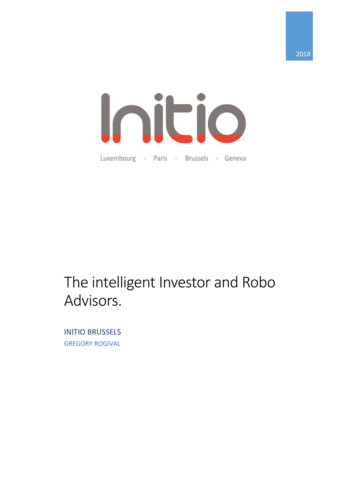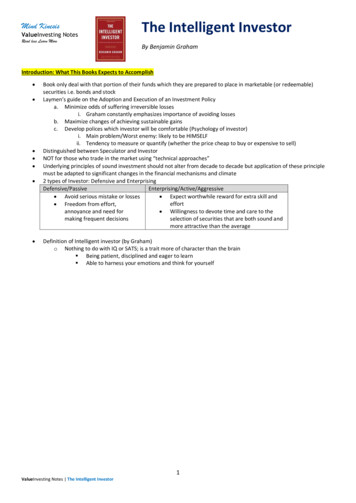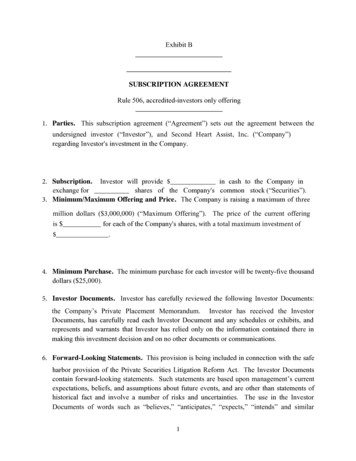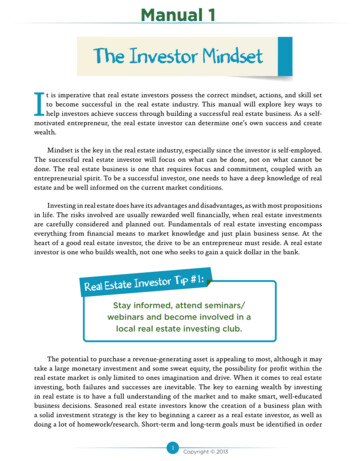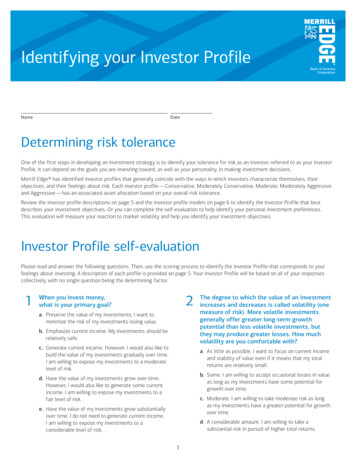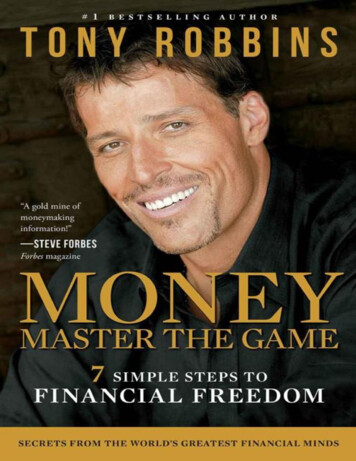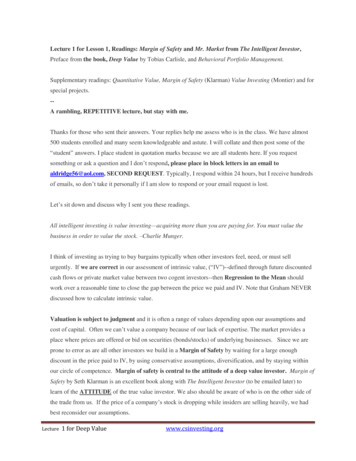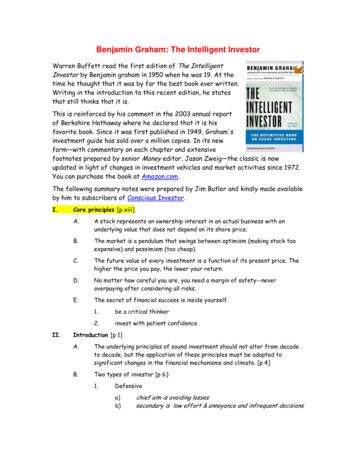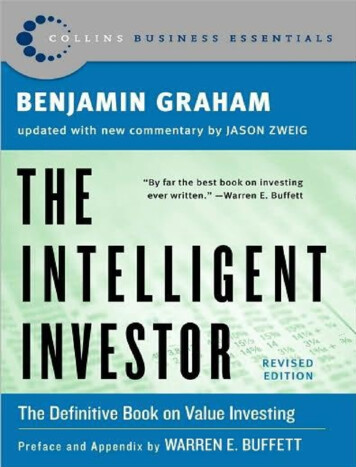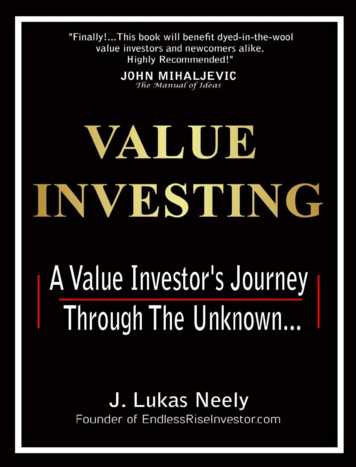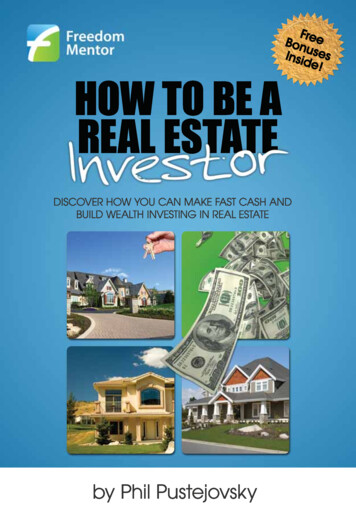
Transcription
How to be aReal EstateInvestorDiscover how you can makefast cash andbuild wealthinvesting in real estateByPhil Pustejovsky
Copyright MMXII Phil PustejovskyAll rights reserved. Without limiting the rights under copyrightreserved above, no part of this publication may be reproduced,stored in or introduced into a retrieval system, or transmitted,in any form, or by any means (electronic, mechanical, photocopying, recording, or otherwise), without the prior writtenpermission of both the copyright owner and the publisher ofthis publication. Any unauthorized transfer of license, use,photocopying, or distribution of these materials to anyone elseother than the licensed client/purchaser is prohibited and willbe prosecuted to the full extent of the law.DISCLAIMER: This publication is for informational purposes only. Please consult qualified attorneys, accountantsand other professionals regarding business and investmentdecisions.ii
This book is dedicated to anyone who has ever dreamed big.You are capable of far more than you could ever imagine.iii
iv
ContentsIntroduction7Part 1: Why Be a Real Estate Investor25Part 2: How to Think Like an Investor35Part 3: Real Estate Investing 10155How to Make Fast Cash57How to Build Long Term Wealth72Part 4: Advanced Investing Techniques87Wholesaling87Pre-Foreclosures97Short Sales101Foreclosures106Tax Lien Certificates & Deeds123Creative Financing128Traditional Purchase141Notes147Part 5: Your Real Estate Future149Appendix A: Building Your Team173Appendix B: Recommended Reading191About the Author194
How to be a Real Estate Investor6
IntroductionWhile bored out of my mind, sitting behind a desk oneday, I considered how to be a real estate investor. I was freshout of college with a degree in mechanical engineering fromVanderbilt University. Many well intentioned adults tried toconvince me that the American dream was to get a 9 to 5 jobwith a Fortune 500 company. But, it sure didn’t feel that wayonce I got one! I was falling asleep at my desk and had nofreedom. It quickly dawned on me that I didn’t want this forthe rest of my working life. In fact, it was about that time thatI heard someone refer to the word “job” as an acronymstanding for, “Just Over Broke.” I wanted the exact opposite.I wanted to be financially free.I began researching how to become financially free atthe library and at book stores. Real estate investing surfacedas a common thread amongst many economically successfulpeople that I studied. That’s when I began to consider how tobe a real estate investor. What fascinated me about realestate was that there were techniques for making money thatdidn’t require investing cash or using my credit, which wasperfect for me at that time because I didn’t have any moneyor any credit.I devoured every book I could get my hands on and attended free tele-seminars, webinars and local live seminars.A whole new exciting world was opening up to me and itappeared to be exactly what I was looking for. It was a way tobecome financially free. Before I could begin to truly educatemyself on the subject, however, my boss and I had a disagreement at work one day that led to me quitting my Fortune 500 job.Rather than go get another job, I decided to focus myfull time efforts on real estate. It was quite a gamble consid-
How to be a Real Estate Investorering I had very little money saved up, no money coming in,and no experience in the field. But, I was determined tomake it work. My parents weren’t all that pleased with mydecision because they had just spent a substantial amount ofmoney on my college education. They reasoned that I didn’tneed to go to one of the most expensive colleges in Americato be a real estate investor. They recommended I get a joband do real estate on the side until my real estate endeavorswere paying me more than my job. It was sound advice thatwent through one ear and out the other.The books and seminars made real estate investingsound so easy. I thought to myself, “If I have all day, everyday, to devote to real estate, how hard can it be?” In hindsight, that one thought was a major miscalculation. I hadfailed to consider the fact that I absolutely did not know whatI was doing. Real estate, as I discovered, is a business thathas tremendous potential, but you really have to know whatyou’re doing to be successful with it. At the time, I didn’thave any money to invest in my education, so unfortunately,I was learning every important lesson of real estate the hardway through the school of hard knocks.I burned through my savings. Because I had no moneycoming in, I couldn’t pay my bills. When I couldn’t pay myrent, I literally went homeless. I was forced to live out of mytruck. Some have asked me why I didn’t move back in withmy parents when this happened. Maybe it was pride, orstubbornness or embarrassment, or just plain geography(since my parents were over 1000 miles away), but I didn’ttell them how bad it had gotten and I didn’t consider movingback home.Just imagine what it felt like to be me back then. Myonly credit card was maxed out, my bank account was overdrawn, and there was no cash in my wallet. I was living out of8
Introductionmy truck, eating off of a case of Bush’s baked beans. To openthe can, I used one of those cheap can openers that hurtsyour fingers when you turned the knob. The blade seemed toalways slide off the edge and it took several minutes just toopen one aluminum can. The beans were cold because Ididn’t have any way to heat them up. I used a plastic spoonfrom Wendy’s to dig out the beans. Those were some darkdays. I would cry myself to sleep each night, wondering howI ever got myself into that mess.A friend, who knew my situation, recommended I go tochurch. At first reluctant, I changed my tune when I considered that they may have free donuts or snacks for newguests. So with the few ounces of gas left in my truck’s tank, Idrove to Christ Church on Old Hickory Boulevard in Brentwood, TN. Not having frequented church as a kid, I didn’treally know what to expect. At first I was very nervous aboutthe experience because people were singing, raising theirhands, and as I later learned, were in the “praise and worship” part of the service. I settled into the far back row of thesecond floor of the sanctuary, wondering when the donutswould arrive. The pastor got behind the pulpit and began topreach. It felt like he was speaking directly to me and mysituation (even though there were more than 500 people inattendance at that Sunday morning service). By the end, heasked for anyone looking to make a change in their life towalk down to the front of the stage and give their heart toChrist. I was sold on what he was offering so I walked all theway down and gave my heart to Christ. At the time, I didn’tknow exactly what I was agreeing to, but I knew I neededhelp and I was desperate. I thought to myself, “Nothing elsehas been working out lately so maybe this will?”With the hubbub of walking down that aisle, I forgotabout the donuts, the original reason why I attended church,9
How to be a Real Estate Investorbut, I did walk out of there a new man. With my new lease onlife, I reassessed my situation and decided I needed somemoney coming in. I got a job as a valet because it paid immediate cash and a friend recommended I referee pee-weefootball because that also paid instantaneously. Soon I waseating food other than cold beans. What’s more, this experience of going homeless had taught me that I needed help if Iwas going to succeed in real estate. I discovered that pullingoneself up by his bootstraps was not what truly successfulpeople did. Successful people don’t go it alone, they reachout for help. I needed to truly educate myself with more thanjust books from the library. I needed the help of anotherperson who had done what I wanted to do. I began searchingfor a mentor, someone who could take me by the hand andshow me the ropes. Have you ever heard of the saying,“When the student is ready, the teacher arrives?”Right about that time, I had located a property well under value. I had put it under contract to purchase for 30,000. The value of the property could be as much as 90,000 if it was all fixed up. I didn’t have the time, moneyor expertise to renovate the house though. A local investorrecommended I “flip” the property, or re-sell the property toanother investor. This technique would provide me withquick cash and I wouldn’t need the time, money or expertiserequired to fix up the property.I put the word out and the details of this deal found itsway to a gentleman who was randomly in Nashville becausehis mother was battling cancer. This guy had come from fivegenerations of real estate investors. He was a Nashvillenative, but had been living on the beach in Florida for thepast several years. He was a street smart person and knewhow to make money.10
IntroductionIn fact, he was so common sense intelligent that hemade more than 180,000 on his first real estate deal whenhe was only 18 years old. He put a corner lot owned by Exxonunder contract for 100,000 and then flipped the parcel toan adjacent property owner for 280,000. How many 18year olds do that? This person knew business and he knewreal estate.As I was showing him the property I wanted him to buy,he began asking me questions about what I was doing. Itdidn’t take long for me to spill the beans and share with himhow bad things had gotten. He was shocked to find out I wasa Vanderbilt graduate with a degree in mechanical engineering choosing to go homeless for my dream of becoming a realestate investor. He said, “If you have enough determinationto stick with your goal of being a real estate investor to thepoint of going homeless, I can show you how to make realmoney in real estate.” He went on to propose, “If you agreeto split profits with me, we can do something together.” Andbefore he finished that sentence, he chimed in with, “Oh, andalso don’t do anything to get me sued. I don’t need thehassle. I can live on the beach with my dog and my Bible, notwork and be just fine, so don’t do anything that would tie meinto a lawsuit.” I agreed to his terms.My arrangement with him was such that he agreed totake me by the hand and show me step by step how to be areal estate investor. My job was to listen to him, howeveroutrageous I thought his instructions were, and do all thelegwork and then we would split the profits 50/50. I’ll neverforget what he told me that first day. He said, “50% of something is a whole lot more than a 100% of nothing.” Thatlesson right there changed my life and it will also changeyour financial life too. As I later discovered, the principle hewas sharing stretches to almost every type of business. The11
How to be a Real Estate Investorgreatest fortunes were built by sharing the profits. Did youknow that at the height of Standard Oil, John D Rockefellerwas only a 1/6th owner in the company? Wealthy peopledon’t try to own 100% of a small pie; they instead, alignthemselves with great people and together take a portion of amuch larger pie. 50% of something is a whole lot more than a100% of nothing.Here was that principle in action. Our first deal togetherdidn’t at first appear to be a good deal at all. It was a verywell built country house on sixteen acres in the rolling hillsof Franklin, TN. The owner had built the property to be hisfamily’s dream home and for several years it was just that.But, his financial situation had changed and he began tostruggle to make ends meet. He hired a real estate agent tosell the property and for more than one year, the property saton the market at a list price of 300,000. The total mortgagebalance on the property was about 275,000. The seller hadtwo loans. The first mortgage was an interest only loan witha principal balance of 225,000 and the second mortgagewas a home equity line of credit (also known as a HELOC)with a balance of 50,000. Together, his total monthlypayment was about 1,500 and at the time, he was fallingseveral months behind.When the deal first crossed my path, it had come to methrough another real estate investor in town. I had spreadthe word out among other investors in my area that if theyhad any potential deals they didn’t want, to send them to meand if I could turn these discarded deals into money, theywould get a referral fee when they closed. In other words, Iwas asking for their junk leads they were already throwing inthe garbage. The concept did generate some leads for me, butmost of them were of no value.12
IntroductionI mentioned this lead to my new mentor thinking it wasworthless, but to my surprise, he said, “Go sign it up. I smellan opportunity.” That was his way of saying, “Get the property under contract.” One of the beautiful aspects of realestate is that you can control property without having to ownit so long as you use the right paperwork. Furthermore, ifyour contracts have the appropriate clauses in them, you canmake the process of getting a property under contract virtually risk-free. On his recommendation, I made the drive tothe property, met with the sellers and offered to purchasetheir property for the amount they owed. I gave the sellers allthe cash I had for earnest money, 1.Rather than turning me down, I was pleasantly surprised to see the sellers agree. They were a bit suspicioussince the property had been listed for over a year with a verywell respected real estate agent and wasn’t selling and herewas a young kid ready to buy it after only viewing the property for a few minutes, but they needed to sell and were opento just about anything. I, however, was somewhat indifferentsince I had experienced so many real estate failures up untilthat point that I wasn’t going to get all that excited until themoney was in my bank account. I was still impressed thoughthat I could tie up a piece of property so easily.“OK, what next?” I asked my mentor. He reviewed thedetails of the deal and determined we needed to see if thesecond mortgage would take less than their full payoff torelease their lien from the property. This is now a much morecommon phrase in real estate, often referred to as a “shortsale”, but at the time, there wasn’t a name for it. Back then,you simply contacted the department that handled the loansthat were in default and you negotiated a reduced payoff(nowadays, it is far more organized and most lending institutions have entire departments that just handle short sale13
How to be a Real Estate Investorrequests). Since the seller had not paid the second mortgagefor several months, the loan was already assigned to thedefault department.My mentor told me to offer 10% of 50,000, or 5,000.I took his advice but didn’t think the bank would accept. Sureenough, they did! The mortgage company faxed a letterstating they would accept 5,000 for their 50,000 secondmortgage. Jackpot! Or was it? Where was I going to come upwith 5,000?Rather than give me 5,000, my mentor wanted me tolearn how to be self-sufficient, how to be a real estate investor, even though I didn’t have money to invest or the abilityto qualify for a real estate loan. He introduced me to theconcept of offering a “rent to own.” The key ingredient to thisconcept was locating a “tenant buyer,” someone who wantedto be a homeowner but was struggling to qualify for a homeloan. To round up some candidates, he instructed me to putout hand written signs on a Friday afternoon at busy streetcorners near the property that said “Rent to Own” as well asa phone number (this was before Craigslist and other onlineclassifieds).Then, another shocking result occurred. The phonerang off the hook, literally. I fielded incoming calls for several days. It had worked. Some simple, handwritten signshad generated an overwhelming response. After a few meetings with tenant buyers that went nowhere, my mentor toldme I needed to concentrate on people who had a downpayment above 10,000 since we had to payoff the secondmortgage of 5,000 as well as catch up the back payments onthe first mortgage which amounted to 4,800. He also saidthat although there would be far fewer of these people, theywould be a better use of my time and I only needed onetenant buyer to do this deal. There’s a great lesson in real14
Introductionestate. You only need one buyer to make a deal happen. Youonly need one.After pouring through a large number of callers whodidn’t fit that description, I finally discovered someone whosaid they had 20,000 to put down. A bit skeptical, I set up atime to meet, but thought to myself, “Who, on earth, has 20,000 available in cash but can’t buy a home the traditional way?” Since cell phone coverage was spotty out in thecountry where that property was situated, we met at a nearbyMcDonalds and they were to follow me to the actual property.While on the drive, I prayed for a miracle. I was stillstruggling to survive, living day by day. The gas tank was soempty that I was almost certain I wouldn’t be able to get backhome. I was so broke there wasn’t even any change in theglove box. I didn’t know what I would do if I ran out of gas.Trailing behind me was a slightly beat up Tahoe with acouple inside who had said they did contract work forLowe’s. They brought in what banks consider self employedincome which made it very difficult for them to get a traditional mortgage. Banks far prefer the W2 income that isgenerated from having a normal job. We drove out past thedevelopments and into the countryside that Tennessee isknown for. There were large horse farms bordered by whitewooden fences stretched as far as the eye could see. Wemoved deeper and deeper into the country as we headedtoward the property.I had shown this home before to a few other couples butthey had all commented that the property was too far out inthe country for them. So I thought its rural setting was anegative. The further we drove into the sticks, the moreconcerned I got that I would look in the rear view mirror andthat Tahoe would be gone. But thankfully, they stayed in tow.15
How to be a Real Estate InvestorWe arrived at the entrance to the driveway. On one sideof the road was an old, half full, completely dilapidatedgarbage truck. The neighbor across the street ran a garbagebusiness and this foul smelling landmark was one of theirlatest equipment failures. So if you had your window down,on your way in, you’d get a fresh whiff of trash. Since my ACwas acting up, I definitely got a whiff.The actual sixteen acres was not square in shape, butmore of a long, rectangular parcel. The house was situated atthe highest point of the plot of land, far back from the road.The dirt driveway hugged along the left edge of the propertyand wound slowly upward before ending at the left side ofthe home. My truck began to crawl down the long drivewaywith the crunching sound of tires rolling over gravel filingthe air. The truck began to distance itself from the Tahoebehind me, not only because I had been there a few timesalready and felt more comfortable navigating the windingdirt road, but also because they were inspecting every detailof the property.I had already parked and was looking back at their progress when something magical occurred. Three small deerpranced across the driveway, right in front of their vehicle. Itwas as if I had staged the experience, with a walkie-talkie inhand, telling an associate, “Queue the deer.” But it wasn’tplanned. I had nothing to do with 3 deer running across theproperty. It was a miracle.The husband and wife emerged from their vehicle witha gigantic smile on their face. They took in a deep breath, theway vacationers do when camping in the mountains. As itturns out, this was exactly what they were looking for in ahome. They wanted to be out in the country with lots of land.After briefly reviewing the inside of the home, they came16
Introductionback to me and said, “We’ll take it. Who do we make thecheck out to?”I was speechless. It worked! This actually worked! Rightbefore my very eyes, this couple wrote out a 20,000 checkto me personally. I said to myself, “What do I do now?” Aftercatching my breath from all the excitement, I knew I neededsome cash that day just to survive, so rather than deposit thecheck and wait several business days for the check to clear, Iwent to the bank the check was drawn on and cashed it. Haveyou ever had 20,000 cash in an envelope before? It’s aunique experience. I was paranoid someone was followingme and was going to nab that money. When I got to my bank,the teller, to which had seen my average account balance thepast 12 months on her computer screen, looked with amazement (and suspicion) as I handed over 20,000 in cash fordeposit. And just like that, there was real money in my bankaccount.Since the property was vacant by this time, the rent toown tenant buyers moved in right away. 5,000 was sent tothe second mortgage to pay off the loan and then 4,800 wassent to the first mortgage to catch up the back payments. Thetenant buyers agreed to pay 1,800 per month and our totalmonthly payment which included the first mortgage payment, taxes and insurance, was 1,300 each month. So weprofited about 10,200 immediately plus 500 per month.Meanwhile, I didn’t have to qualify for a loan or use any ofmy own cash to purchase the property. I was becoming areal estate investor!We referred the tenant buyers to a mortgage broker tohelp them get on the path to being able to get a loan to payoffthe rest of the property. In 3 months, the mortgage brokerhad qualified them for a loan. She had found a special loanprogram for self employed people. The tenant buyers had17
How to be a Real Estate Investoragreed to pay 275,000 for the property and since they hadalready put down 20,000, they only needed a loan for 255,000. The first mortgage balance we had to pay off was 225,000. After closing costs, we were looking at earningabout 25,000 when the tenant buyers’ loan went through.Right before the closing, there was another twist. The title company had noticed a very odd detail in the recordedloan paperwork. The legal description on the paperworkdescribed the neighbor’s property. In other words, the firstmortgage was on the little neighbor’s home, not the sixteenacres and beautiful country home. I was not sure how thiswas going to help anything but my mentor had a plan. Hereasoned that we could potentially negotiate a lower payoffsince the attorneys fees the bank would incur to correct thepaperwork could run into the tens of thousands. With a fewphone calls, sure enough, the first mortgage reduced theirpayoff to 206,000. This last minute first mortgage payoffreduction put another 19,000 profit in our pockets.In all, this deal netted more than 56,000. I didn’t borrow any money, didn’t qualify for a loan, didn’t use any cashto acquire the property and everyone was happy with theoutcome. The sellers were happy to have sold the propertywithout owing anything, the new buyers purchased theirdream home and we had made a ton of money!Had it not been for my mentor, I would have received100% of nothing. Instead, I was 28,000 richer, an amountsome people work an entire year at their job to earn. Thatwas the largest amount of money I had ever put into my bankaccount up to that point in my life. I would go to the ATMjust to check my balance because I couldn’t believe my eyes.Interestingly enough, about a year later, I followed backup with those rent to own tenant buyers who had purchasedthe property and innocently asked how they were getting18
Introductionalong with all those deer running across their property. Shereplied, “Since that day you showed us this property for thefirst time, we’ve only seen deer here one other time.” Do youbelieve in miracles?Think of all the different parts of my first deal with mymentor that most people would never have imagined wouldhave worked. First, that a seller would so easily have soldtheir home to me with 1 earnest money. Second, that thesecond mortgage would have accepted 5,000 for a 50,000loan. Third, that I could sell a property in a few weeks that atop notch real estate agent couldn’t after over a year. Fourth,that there would be people out there who can’t qualify for atraditional mortgage but have money to put down and canafford the monthly payment. Fifth, that a first mortgagewould reduce their payoff due to incorrect loan paperwork.That’s one of the powerful aspects of having a mentor. Theyteach you things you didn’t know you didn’t know. It turnsout that all of those details can be fairly common in realestate under the right circumstances. While most people maynever imagine that such series of events could ever cometogether, for experienced real estate investors, they areconsidered everyday occurrences.After that first deal together, we were off to the races.He guided and mentored me to more money than I couldhave ever dreamed. We did all types of deals: short sales,foreclosures, wholesales, rehabs, lease purchases and creative finance deals. You name it, we did it all. Life was good.With my new found freedom, I traveled, enjoyed life andthen met the woman of my dreams and got married.One day, my wife and I asked ourselves, “Since we can,if there is any place in the world we could live, where wouldwe live and why?” Have you ever asked yourself that question? It’s not as easy of an answer as you may think. After19
How to be a Real Estate Investorseveral years of deliberation, we decided on a beachfrontcommunity in Florida where we bought a mansion on thewater (it was a distressed property that we got for about halfof its value, of course). It’s paradise for us and I surf and fishas much as my wife will allow. Side note gentlemen: Happywife Happy life.Each time I would be in an airplane, I would see thousands of homes scattered in all directions. On one particularflight, this thought popped into my mind, “How can I dodeals all across the country?” I could see that there werethousands of cities and thousands of homes in each one ofthose cities. How could I be a part of making money on allthose deals?My first approach was to build a company with employees. Since I could do deals long distance, without ever seeingthe property myself in person, my plan was to train myemployees on what to do. I began hiring people. Soon, Inoticed that my plan was not working out well. What Ilearned was that employees did about 75% of what I woulddo, despite how well I trained them. In real estate, 75%doesn’t cut it. For a deal to close, someone had to be on topof the details and I found that 9 to 5 employees didn’t haveany major incentive to take care of the little details to ensuredeals closed. They were paid to show up, not to perform.Then, I had an “ah-ha” moment. I reasoned that perhaps the best way to expand across the country would not beto hire employees, but instead, to mentor those interested inbecoming real estate investors the way my mentor did forme. We could split the profits 50/50 and now, instead of a75% employee that did just enough to not get fired, I wouldhave a business partner that was 100% committed to thefinancial success of each deal. Plus, I would be passing on aset of skills that could benefit the people I mentored. Not20
Introductiononly could I gain economically from this new approach, butalso I could pass on a legacy of having helped others achievetheir dreams. In hindsight, it seems like such an obvioussolution, but at the time, it was a revolutionary idea for me.As always, great ideas include great challenges. Being asuccessful real estate investor is much different from being agreat real estate mentor. It’s one thing to be able to dosomething yourself. It’s a completely different challenge tobe able to teach someone else how to do it. There were manyyears of trial and error as I crafted a system for teachingothers how to be a real estate investor. Not only did eachtask, technique, and strategy have to be simplified, it alsohad to work most, if not all of the time. Anytime you teachsomeone else a subject, you have to know it so much morethoroughly. It was like being mentored all over again; onlythis time, my mentors were the students I was teaching.Mentoring someone outside of your own backyard, in acompletely different area with different laws, demographicsand market dynamics was another huge challenge for metoo. There were many mistakes made, but I grew from them.And, eventually, I made some breakthroughs. Although, themajority of real estate investing is universal, each area is alsounique. Some strategies work better in some areas, but notas well in others. In the beginning, I looked at this as ahandicap, but now, it has become a strength. I mentor from anationwide perspective so I see more opportunities oftentimes than those that only see the narrow, local view. Youalso have more resources at a nationwide level, such asclosing companies, mortgage brokers and many other criticalteam members that allow us to complete creative transactions that oftentimes a local closing company or mortgagebroker is unable to do. Sometimes in life, what you think is21
How to be a Real Estate Investorgoing to be a hindrance to your success becomes one of thereasons for your success.I so appreciate all those students in the beginning whoendured the kinks and glitches first hand. Thankfully, despite those initial growing pains, my students experiencedextraordinary results. And, as luck would have it, teachingothers comes naturally to me. At least that is what my students have told me.In addition to the success of my early students, a fewrose above the crowd and truly impressed me with their owncreativity and ingenuity. They had taken what they hadlearned from me and then added their own entrepreneurialtouch to it. I was always told to surround myself with greatpeople and so for those students that truly shined and had aheart for teaching, I invited them to coach with me. Together,
I devoured every book I could get my hands on and at-tended free tele-seminars, webinars and local live seminars. A whole new exciting world was opening up to me and it appeared to be exactly what I was looking for. It was a way to become financially free. Before I could begin to truly educate myself on the subject, however, my boss and I had a .
